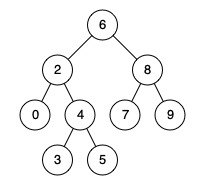Given a binary search tree (BST), find the lowest common ancestor (LCA) of two given nodes in the BST.
According to the definition of LCA on Wikipedia: “The lowest common ancestor is defined between two nodes p and q as the lowest node in T that has both p and q as descendants (where we allow a node to be a descendant of itself).”
Example 1:
Input: root = [6,2,8,0,4,7,9,null,null,3,5], p = 2, q = 8 Output: 6 Explanation: The LCA of nodes 2 and 8 is 6.
Example 2:
Input: root = [6,2,8,0,4,7,9,null,null,3,5], p = 2, q = 4 Output: 2 Explanation: The LCA of nodes 2 and 4 is 2, since a node can be a descendant of itself according to the LCA definition.
Example 3:
Input: root = [2,1], p = 2, q = 1 Output: 2
Constraints:
- The number of nodes in the tree is in the range
[2, 105]. -109 <= Node.val <= 109- All
Node.valare unique. p != qpandqwill exist in the BST.
Companies:
LinkedIn, Facebook, Microsoft, Google, Uber
Related Topics:
Tree, Depth-First Search, Binary Search Tree, Binary Tree
Similar Questions:
- Lowest Common Ancestor of a Binary Tree (Medium)
- Smallest Common Region (Medium)
- Lowest Common Ancestor of a Binary Tree II (Medium)
- Lowest Common Ancestor of a Binary Tree III (Medium)
- Lowest Common Ancestor of a Binary Tree IV (Medium)
// OJ: https://leetcode.com/problems/lowest-common-ancestor-of-a-binary-search-tree/
// Author: github.com/lzl124631x
// Time: O(H)
// Space: O(H)
class Solution {
public:
TreeNode* lowestCommonAncestor(TreeNode* root, TreeNode* p, TreeNode* q) {
if (p->val > q->val) swap(p, q);
function<TreeNode*(TreeNode*)> dfs = [&](TreeNode *node) -> TreeNode* {
if (!node) return nullptr;
if (node->val >= p->val && node->val <= q->val) return node;
if (node->val < p->val) return dfs(node->right);
return dfs(node->left);
};
return dfs(root);
}
};// OJ: https://leetcode.com/problems/lowest-common-ancestor-of-a-binary-search-tree/
// Author: github.com/lzl124631x
// Time: O(H)
// Space: O(H)
class Solution {
public:
TreeNode* lowestCommonAncestor(TreeNode* root, TreeNode* p, TreeNode* q) {
if (root->val > p->val && root->val > q->val) return lowestCommonAncestor(root->left, p, q);
if (root->val < p->val && root->val < q->val) return lowestCommonAncestor(root->right, p, q);
return root;
}
};